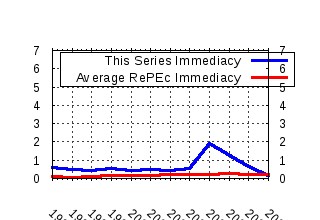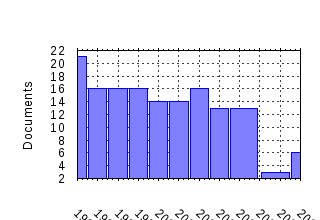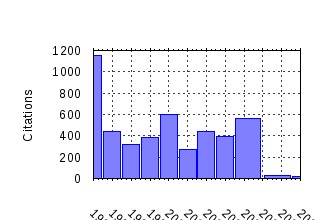
|
|
|||||||||||||||||||||||||||||||||||||||||||||||||||||||||||||||||||||||||||||||||||||||||||||||||||||||||||||||||||||||||||||||||||||||||||||||||||||||||||
Journal of Economic Growth Raw citation data, Impact Factor, Immediacy Index, Published documents, Citations received, , Most cited papers , Recent citations and documents published in this series in EconPapers.
Most cited documents in this series: (1) RePEc:kap:jecgro:v:1:y:1996:i:3:p:363-89
Reopening the Convergence Debate: A New Look at Cross-Country Growth Empirics. (1996). (2) RePEc:kap:jecgro:v:9:y:2004:i:3:p:271-303 Do Institutions Cause Growth? (2004). (3) RePEc:kap:jecgro:v:9:y:2004:i:2:p:131-165 Institutions Rule: The Primacy of Institutions Over Geography and Integration in Economic Development (2004). (4) RePEc:kap:jecgro:v:5:y:2000:i:1:p:5-32
Inequality and Growth in a Panel of Countries. (2000). (5) RePEc:kap:jecgro:v:8:y:2003:i:2:p:155-94
Fractionalization. (2003). (6) RePEc:kap:jecgro:v:1:y:1996:i:2:p:149-87
Growth, Income Distribution, and Democracy: What the Data Say. (1996). (7) RePEc:kap:jecgro:v:7:y:2002:i:3:p:195-225
Growth Is Good for the Poor. (2002). (8) RePEc:kap:jecgro:v:5:y:2000:i:1:p:33-63
Who Gives Foreign Aid to Whom and Why? (2000). (9) RePEc:kap:jecgro:v:1:y:1996:i:1:p:1-27
Democracy and Growth. (1996). (10) RePEc:kap:jecgro:v:1:y:1996:i:1:p:75-93
A Theory of Persistent Income Inequality. (1996). (11) RePEc:kap:jecgro:v:1:y:1996:i:2:p:189-211
Political Instability and Economic Growth. (1996). (12) RePEc:kap:jecgro:v:4:y:1999:i:4:p:385-412
Where Did All the Growth Go? External Shocks, Social Conflict, and Growth Collapses. (1999). (13) RePEc:kap:jecgro:v:2:y:1997:i:1:p:27-59
Empirics for Growth and Distribution: Stratification, Polarization, and Convergence Clubs. (1997). (14) RePEc:kap:jecgro:v:9:y:2004:i:3:p:347-383 Accounting for Fertility Decline During the Transition to Growth (2004). (15) RePEc:kap:jecgro:v:8:y:2003:i:3:p:267-99
Inequality and Growth: What Can the Data Say? (2003). (16) RePEc:kap:jecgro:v:1:y:1996:i:1:p:125-42
Social Conflict and Growth. (1996). (17) RePEc:kap:jecgro:v:2:y:1997:i:1:p:1-26
Technological Diffusion, Convergence, and Growth. (1997). (18) RePEc:kap:jecgro:v:5:y:2000:i:1:p:87-120
A Cross-Country Empirical Investigation of the Aggregate Production Function Specification. (2000). (19) RePEc:kap:jecgro:v:3:y:1998:i:4:p:313-35
Schumpeterian Growth without Scale Effects. (1998). (20) RePEc:kap:jecgro:v:2:y:1997:i:1:p:93-124
The Distribution of Human Capital and Economic Growth. (1997). (21) RePEc:kap:jecgro:v:7:y:2002:i:4:p:411-39
Does the Mortality Decline Promote Economic Growth? (2002). (22) RePEc:kap:jecgro:v:1:y:1996:i:2:p:213-41
Power, Growth, and the Voracity Effect. (1996). (23) RePEc:kap:jecgro:v:12:y:2007:i:1:p:51-76 (). (24) RePEc:kap:jecgro:v:2:y:1997:i:4:p:339-67
Comparison Utility in a Growth Model. (1997). (25) RePEc:kap:jecgro:v:3:y:1998:i:4:p:283-311
Technological Change and Population Growth. (1998). (26) RePEc:kap:jecgro:v:5:y:2000:i:4:p:341-60
The Role of Financial Development in Growth and Investment. (2000). (27) RePEc:kap:jecgro:v:3:y:1998:i:1:p:29-52
Demographic Transition, Income Distribution, and Economic Growth. (1998). (28) RePEc:kap:jecgro:v:6:y:2001:i:3:p:167-86
Climate and Scale in Economic Growth. (2001). (29) RePEc:kap:jecgro:v:8:y:2003:i:2:p:195-222
Ethnic and Cultural Diversity by Country. (2003). (30) RePEc:kap:jecgro:v:7:y:2002:i:1:p:5-24
Trade and the Transmission of Technology. (2002). (31) RePEc:kap:jecgro:v:1:y:1996:i:1:p:95-124
Convergence Empirics across Economies with (Some) Capital Mobility. (1996). (32) RePEc:kap:jecgro:v:1:y:1996:i:2:p:2a77-304
A Positive Theory of Social Security. (1996). (33) RePEc:kap:jecgro:v:4:y:1999:i:3:p:239-76
Life during Growth. (1999). (34) RePEc:kap:jecgro:v:6:y:2001:i:1:p:5-37
Global Income Divergence, Trade, and Industrialization: The Geography of Growth Take-Offs. (2001). (35) RePEc:kap:jecgro:v:2:y:1997:i:2:p:131-53
Convergence Revisited. (1997). (36) RePEc:kap:jecgro:v:5:y:2000:i:1:p:65-85
Too Much of a Good Thing? The Economics of Investment in R&D. (2000). (37) RePEc:kap:jecgro:v:1:y:1996:i:4:p:449-96
The Economics of Poverty Traps: Part One: Complete Markets. (1996). (38) RePEc:kap:jecgro:v:6:y:2001:i:3:p:229-54
Measures of Human Capital and Nonlinearities in Economic Growth. (2001). (39) RePEc:kap:jecgro:v:6:y:2001:i:4:p:317-35
The Middle Class Consensus and Economic Development. (2001). (40) RePEc:kap:jecgro:v:2:y:1997:i:4:p:399-418
Location and the Growth of Nations. (1997). (41) RePEc:kap:jecgro:v:4:y:1999:i:2:p:119-37
Notes on Growth Accounting. (1999). (42) RePEc:kap:jecgro:v:6:y:2001:i:4:p:337-57
Agricultural Productivity Growth and Escape from the Malthusian Trap. (2001). (43) RePEc:kap:jecgro:v:8:y:2003:i:1:p:5-46
The United States as a Coastal Nation. (2003). (44) RePEc:kap:jecgro:v:8:y:2003:i:4:p:355-78
Geography and Poverty Traps. (2003). (45) RePEc:kap:jecgro:v:4:y:1999:i:3:p:277-303
Why Do Resource-Abundant Economies Grow More Slowly? (1999). (46) RePEc:kap:jecgro:v:7:y:2002:i:4:p:347-69
States and Markets: The Advantage of an Early Start. (2002). (47) RePEc:kap:jecgro:v:6:y:2001:i:4:p:285-315
Precautionary Demand for Education, Inequality, and Technological Progress. (2001). (48) RePEc:kap:jecgro:v:1:y:1996:i:2:p:243-76
Property and Contract Rights in Autocracies and Democracies. (1996). (49) RePEc:kap:jecgro:v:4:y:1999:i:3:p:305-30
Patterns of Economic Development and the Formation of Clubs. (1999). (50) RePEc:kap:jecgro:v:9:y:2004:i:1:p:47-80 Habit Formation, Catching Up with the Joneses, and Economic Growth (2004). Recent citations received in: | 2007 | 2006 | 2005 | 2004 Recent citations received in: 2007 (1) RePEc:pra:mprapa:2776 Social rewards in science and economic growth (2007). University Library of Munich, Germany / MPRA Paper Recent citations received in: 2006 (1) RePEc:cwm:wpaper:48 Structural Policies and Growth: Time Series Evidence from a Natural Experiment (2006). Department of Economics, College of William and Mary / Working Papers (2) RePEc:unu:wpaper:rp2006-120 The Evolution of Personal Wealth in the Former Soviet Union and Central and Eastern Europe (2006). World Institute for Development Economic Research (UNU-WIDER) / Working Papers Recent citations received in: 2005 Recent citations received in: 2004 (1) RePEc:bro:econwp:2004-13 The Demographic Transition and the Emergence of Sustained Economic Growth (2004). Brown University, Department of Economics / Working Papers (2) RePEc:bro:econwp:2004-15 From Stagnation to Growth:Unified Growth Theory (2004). Brown University, Department of Economics / Working Papers (3) RePEc:bro:econwp:2004-16 Trading Population for Productivity (2004). Brown University, Department of Economics / Working Papers (4) RePEc:chb:bcchwp:298 Economic Growth in Chile: Evidence, Sources and Prospects (2004). Central Bank of Chile / Working Papers Central Bank of Chile (5) RePEc:crd:wpaper:05003 Rosenbergs Learning by Using and Technology Diffusion (2004). Concordia University, Department of Economics / Working Papers (6) RePEc:ecm:feam04:738 Education, Poverty and Child Labour (2004). Econometric Society / Econometric Society 2004 Far Eastern Meetings (7) RePEc:esi:evopap:2004-14 Economic Systems of OECD Nations: Impact and Evolution (2004). Max Planck Institute of Economics, Evolutionary Economics Group / Papers on Econonmics and Evolution (8) RePEc:fip:fedmwp:630 Efficiency with endogenous population growth (2004). Federal Reserve Bank of Minneapolis / Working Papers (9) RePEc:hhs:gunwpe:0146 Unbundling Ex-Colonies: A Comment on Acemoglu, Johnson, and Robinson, 2001 (2004). Göteborg University, Department of Economics / Working Papers in Economics (10) RePEc:iza:izadps:dp995 The Optimal Timing of School Tracking (2004). Institute for the Study of Labor (IZA) / IZA Discussion Papers (11) RePEc:jhu:papers:516 Some Foundations for Multiplicative Habits Models (2004). The Johns Hopkins University,Department of Economics / Economics Working Paper Archive (12) RePEc:mmf:mmfc04:47 Deep Pockets: Research and Development Persistence and Economic Growth (2004). Money Macro and Finance Research Group / Money Macro and Finance (MMF) Research Group Conference 2004 (13) RePEc:nbr:nberwo:10231 Efficiency with Endogenous Population Growth (2004). National Bureau of Economic Research, Inc / NBER Working Papers (14) RePEc:nbr:nberwo:10347 On the Distributional Consequences of Child Labor Legislation (2004). National Bureau of Economic Research, Inc / NBER Working Papers (15) RePEc:nbr:nberwo:10767 Growth and Ideas (2004). National Bureau of Economic Research, Inc / NBER Working Papers (16) RePEc:nbr:nberwo:10821 Corruption in America (2004). National Bureau of Economic Research, Inc / NBER Working Papers (17) RePEc:nzt:nztwps:04/19 Institutions, Firms and Economic Growth (2004). New Zealand Treasury / Treasury Working Paper Series (18) RePEc:onb:oenbmp:y:2004:i:1:b:2 Determinants of Long-Term Growth in Austria â A Call for a National Growth Strategy (2004). Monetary Policy & the Economy (19) RePEc:sce:scecf4:59 Asset Pricing with Delayed Consumption Decisions (2004). Society for Computational Economics / Computing in Economics and Finance 2004 (20) RePEc:tud:ddpiec:138 Education, Research, and Economic Growth (2004). Institut für Volkswirtschaftslehre (Department of Economics), Technische Universität Darmstadt (Darmstadt University of Technology) / Darmstadt Disc (21) RePEc:wly:jintdv:v:16:y:2004:i:7:p:933-937 Making globalization work for the poor: the 2000 White Paper reconsidered (2004). Journal of International Development (22) RePEc:wpa:wuwpdc:0408003 Village versus Market Social Capital: An Approach to Development (2004). EconWPA / Development and Comp Systems (23) RePEc:wpa:wuwpge:0409003 From Stagnation to Growth: Unified Growth Theory (2004). EconWPA / GE, Growth, Math methods (24) RePEc:wpa:wuwpge:0409005 The Demographic Transition and the Emergence of Sustained Economic Growth (2004). EconWPA / GE, Growth, Math methods (25) RePEc:wpa:wuwpge:0410001 Trading Population for Productivity (2004). EconWPA / GE, Growth, Math methods Warning!! This is still an experimental service. The results of this service should be interpreted with care, especially in research assessment exercises. The processing of documents is automatic. There still are errors and omissions in the identification of references. We are working to improve the software to increase the accuracy of the results. Source data used to compute the impact factor of RePEc series. |
|||||||||||||||||||||||||||||||||||||||||||||||||||||||||||||||||||||||||||||||||||||||||||||||||||||||||||||||||||||||||||||||||||||||||||||||||||||||||||




